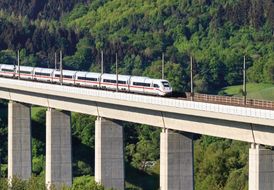Qualification and training
We are one of the largest companies providing education and training in Germany, and offer training in 50 apprenticeship professions. Even in uncertain times, we provide young people with secure career prospects, and typically offer a permanent contract to vocational trainees and dual-degree students after successfully passing the final examination. The Covid-19 pandemic does not change this, because committed young professionals continue to be needed for a Strong Rail system and a successful transition to more sustainble mobility and transport. In light of this need, the number of trainees and dual-degree students increased by over 10% from 2019 to 2021.
YOUNG PROFESSIONALS IN GERMANY AS OF DEC 31 / NP | 2021 | 2020 | 2019 | |
Vocational trainees 1) | 11,668 | 11,356 | 10,676 | |
Dual-degree students 1) | 1,316 | 1,237 | 1,081 | |
Graduate trainees 2) | 128 | 151 | 146 | |
Interns 2) | 667 | 683 | 664 | |
“Chance plus” participants 3) | 184 | 211 | 195 | |
Total 3) | 13,963 | 13,638 | 12,762 | |
1) Includes all class years of vocational training (usually three class years for both vocational trainees and dual-degree students).
2) Companies with about 98% of domestic employees.
3) Previous years’ figures adjusted.
We are continuously increasing our capacity so that we can qualify additional personnel professionally and quickly.
Figures correspond to respective career objective.
In 2021, about 4,500 vocational trainees and dual-degree students started their apprenticeships or studies at DB Group (previous year: about 4,600). In 2021, we received about 103,000 applications for training places in the Integrated Rail System (previous year: about 94,000). This shows that we are an attractive employer, especially among young people, in times of discussions about climate change, sustainability and environmental protection. As before, most vocational trainees started their career as railway employees in operational services, or as electronics engineers.
We are involved in the reorganization of the most important apprenticeships in rail transport with social partners. For example, in 2021, the focus was on the restructuring of the apprenticeship for railway employees in operational services. From August 2022, it is expected that new railway employees in operational services will be trained with the new content.
All young professionals in the first year of teaching/study received a mobile end device in 2021. The provision of mobile end devices was a key factor for the successful continuation of the young talent programs during the Covid-19 pandemic.
Further information can be found in the section Securing young talent.



